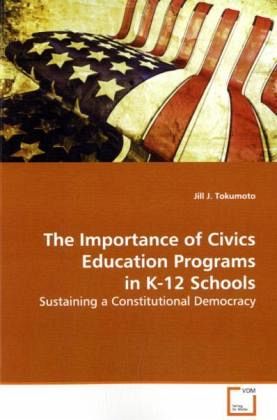
The Importance of Civics Education Programs in K-12 Schools
Sustaining a Constitutional Democracy
Versandkostenfrei!
Versandfertig in 6-10 Tagen
39,99 €
inkl. MwSt.

PAYBACK Punkte
20 °P sammeln!
American democracy is at risk. The United States isconsidered the world leader in education and influence, yet fewcitizens know how their own government works or their responsibilitiesas citizens. The work of civic commitment is left to a small minorityof citizens who choose to participate. There are social core groupssuch as families, churches, and peers that help develop Americans'knowledge and the skills that shape civic character andcommitments. Social institutions such as schools, with their mix ofvarying ages, cultures, and view points, bear a historic responsibility fordeveloping civic ...
American democracy is at risk. The United States is
considered the
world leader in education and influence, yet few
citizens know how
their own government works or their responsibilities
as citizens. The
work of civic commitment is left to a small minority
of citizens who
choose to participate. There are social core groups
such as families,
churches, and peers that help develop Americans'
knowledge and
the skills that shape civic character and
commitments. Social
institutions such as schools, with their mix of
varying ages, cultures,
and view points, bear a historic responsibility for
developing civic
competence and participation. Yet schools across the
nation do not
have a formalized civics curriculum throughout the K-12
educational system. Civic education is one of the
essential elements
to sustain this constitutional democracy. It is the
foundation for the
American identity and yet, by the time students reach
high school,
they lack even a basic knowledge of civics. Without this
indispensable understanding of our national
character, the United
State cannot maintain its position as a leader and
educator of
democracy.
considered the
world leader in education and influence, yet few
citizens know how
their own government works or their responsibilities
as citizens. The
work of civic commitment is left to a small minority
of citizens who
choose to participate. There are social core groups
such as families,
churches, and peers that help develop Americans'
knowledge and
the skills that shape civic character and
commitments. Social
institutions such as schools, with their mix of
varying ages, cultures,
and view points, bear a historic responsibility for
developing civic
competence and participation. Yet schools across the
nation do not
have a formalized civics curriculum throughout the K-12
educational system. Civic education is one of the
essential elements
to sustain this constitutional democracy. It is the
foundation for the
American identity and yet, by the time students reach
high school,
they lack even a basic knowledge of civics. Without this
indispensable understanding of our national
character, the United
State cannot maintain its position as a leader and
educator of
democracy.












